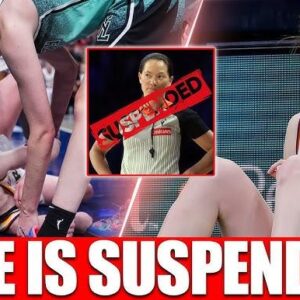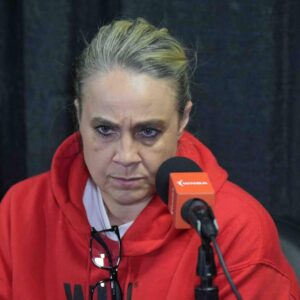In a fiery and pointed commentary, conservative commentator Candace Owens has demanded that the NFL sever its ties with pop sensation Taylor Swift, claiming that the singer’s “erratic behavior and statements go beyond acceptable limits.” Owens’ comments, made on Monday, have sparked a new wave of controversy, as the long-standing relationship between the NFL and Swift—who has recently become a fixture at Kansas City Chiefs games—faces increased scrutiny.

Owens, known for her bold and often polarizing opinions, took aim at Swift in response to remarks made by Chiefs kicker Harrison Butker, who recently sparked backlash for espousing a range of socially conservative views during an appearance. Butker, speaking on the New Heights podcast hosted by brothers Jason and Travis Kelce, said a woman’s most important role was as a “homemaker” and referred to LGBTQ+ Pride Month as an example of “deadly sins.” His controversial speech prompted both support and criticism, as it touched on hot-button cultural issues.
Candace Owens didn’t hold back in her latest criticism, which linked Swift to the controversial remarks by Butker. Owens argued that the NFL, which has heavily embraced Swift’s presence at games, should reconsider its connection with the pop star, alleging that Swift’s actions and statements were increasingly problematic in the context of her public persona.
“Taylor Swift’s behavior and statements have gone beyond what is acceptable in a professional sports environment,” Owens said. “The NFL needs to distance itself from her. Her erratic behavior and controversial opinions are not a good look for the league.”
Owens has previously criticized Swift for her political activism and social stances, particularly on issues like gender identity and reproductive rights. Swift has long been a vocal supporter of LGBTQ+ rights and women’s empowerment, but it’s her ongoing presence at Chiefs games that seems to have riled up conservative figures like Owens, who argue that Swift’s involvement in the NFL undermines its neutrality and appeal to a broad fanbase.

Owens contended that the NFL should focus on sports and entertainment rather than social or political movements. “The NFL is meant to be an escape for people from the chaos of the real world. We need the game to be about football, not about divisive social issues,” Owens continued. “While Taylor Swift might be a pop icon, her involvement with the NFL should raise serious questions about what kind of messages the league is sending.”
Amid the ongoing controversy, the Kelce brothers have also come under the spotlight due to Harrison Butker’s comments, with Jason Kelce offering a defense while simultaneously distancing himself from certain aspects of the speech. On a May 24 episode of the New Heights podcast, Jason Kelce addressed Butker’s views, particularly the statement that a woman’s most important title is “homemaker.”
Kelce, who has been outspoken on social issues in the past, made it clear that while he respected Butker’s right to express his beliefs, he did not fully align with everything Butker said. “I believe that we all have the right to our own opinions, and while I respect Harrison’s right to speak his mind, I have to make it clear that there are parts of what he said that I don’t align myself with,” Jason Kelce stated on the podcast.
This comment came amid growing scrutiny over Butker’s remarks, which many have criticized as outdated or offensive, particularly in light of the increasing cultural shift towards gender equality and LGBTQ+ rights. Jason’s careful distinction between his own views and those expressed by Butker shows the tension within the NFL community as players navigate the intersection of personal beliefs and their public platform.
The situation has left the NFL in a delicate position, caught between its desire to remain an entertainment giant while also navigating the diverse political and social views of its players, fans, and celebrities. Swift, whose presence at Chiefs games has drawn massive media attention, remains one of the league’s most high-profile and influential figures in recent months. Her relationship with Travis Kelce has become a topic of constant discussion in the sports and entertainment media, making her a central figure in the NFL’s off-field storylines.

At the same time, Butker’s comments—coupled with his apparent alignment with socially conservative views—have put the NFL in an uncomfortable position, as the league has made strides in embracing inclusivity and diversity. While some fans and players support Butker’s right to express his views, others feel that his comments undermine the NFL’s efforts to cater to a broad and inclusive audience.
In the midst of this, Owens’ demand for the NFL to sever ties with Swift is indicative of the larger cultural battle unfolding in American sports. As the NFL seeks to balance its image as a mainstream sports entertainment brand with the personal views of its players, celebrities, and fans, it will likely continue to face scrutiny over its involvement with political and social figures.
As the situation continues to develop, all eyes will be on the NFL to see how they respond to Owens’ call for Swift’s removal and the controversy surrounding Butker’s remarks. While it is unlikely that Swift’s involvement with the league will end anytime soon, Owens’ comments highlight the ongoing divide between conservative and liberal factions of the sports world.
For now, the NFL is in a tricky position. With the added attention surrounding Swift’s relationship with Travis Kelce and Butker’s divisive comments, it will be interesting to see whether the league takes any steps to address the growing tension between these high-profile figures.
As the NFL continues to grapple with balancing entertainment, sports, and personal politics, one thing is certain: the lines between pop culture and sports are becoming increasingly blurred, and how the league navigates these waters could define its future. The fallout from Candace Owens’ criticism, coupled with Jason Kelce’s comments, signals that the debate over the NFL’s role in social and political issues is far from over.





